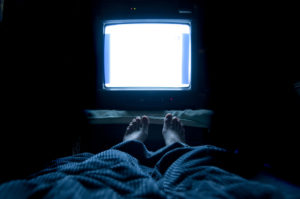Is Screen Time Before Bed Impacting Your Sleep?
Electronics are such an integral part of life in today’s ultra-connected society, that you may not even realize just how much time you spend looking at a screen each day. According to the 2014 Nielsen’s Total Audience Report, Americans age 18 and over spend over 11 hours per day engaged in some sort of screen time, whether for work, leisure, or entertainment.
While these electronic innovations tend to serve our waking lives well by helping us stay connected, productive, and entertained, studies have shown that too much screen time before bed can drastically impact your sleep quality as well.
What is Screen Time?
Screen time is simply any time that you spend looking at, or watching the illuminated screen of an electronic device, such as:
• Televisions
• Computers
• Smartphones
• Tablets
• E-readers
• Video games
Smart Device Usage Statistics
Of all the electronic devices you can use or encounter in a day, the smartphone is becoming the most popularly and heavily used. This is largely because a smartphone is both powerful and portable, so you can do searches, check email and social media, and shop from anywhere that has a Wi-Fi connection.
According to Pew Research Center, 64 percent of adult Americans use smartphones, 32 percent own e-readers, and 42 percent have tablet computers. With regard to smartphone usage, they discovered the following trends in their 2014 studies:
• Twenty-nine percent of users described their smartphone as “something they could not imagine living without.”
• Sixty-seven percent of people admitted to consistently checking their phone, even when they had not received any messages or alerts.
How Does Screen Time Impact Sleep?
While staying “plugged in” during the day may help you accomplish more of your goals, failing to “unplug” at night can also detrimentally impact your sleep. According to a survey by AT&T and The Center for Internet and Technology Addiction, 53 percent of people become upset if they are without their phones, and 61 percent of Americans sleep with their phones on and near the bed.
According to The National Sleep Foundation, using electronics in your bedroom can actually disrupt the natural patterns of your sleep-wake cycles, primarily due to the light emitted by the screen. The photoreceptors in your retinas distinguish between light and darkness, and send a message alerting your brain whether you are in a day or night cycle. Light naturally energizes and promotes wakefulness, and darkness promotes calm, rest and triggers sleep cycles.
The light of a television, smartphone, or tablet is enough to incorrectly cue your brain, and signal wakefulness in your body. By engaging in screen time at bedtime, you disrupt your natural wake-sleep cycle. This disruption makes it harder for you to unwind and sleep peacefully at night to get the rejuvenating, quality sleep your body needs.
Tips for Creating a Relaxing, Screen-free Sleep Environment
To help you unwind and get a restful night of sleep, you need a soothing, relaxing sleep environment and schedule. The National Sleep Foundation suggests following these tips to keep your sleep-wake cycle free of disruption:
• Create a relaxation ritual, free of bright lights and screens, and do it at the same time each night as you unwind and prepare for sleep.
• Remove electronics such as televisions, computers, and smartphones from your sleep environment entirely.
• Reserve an hour to wind down each night, and spend that time doing a relaxing activity such as reading a book.
• If you are unable to sleep once you’ve gone to bed, get up and go into another room. Do something else until you feel tired, and then try again.


